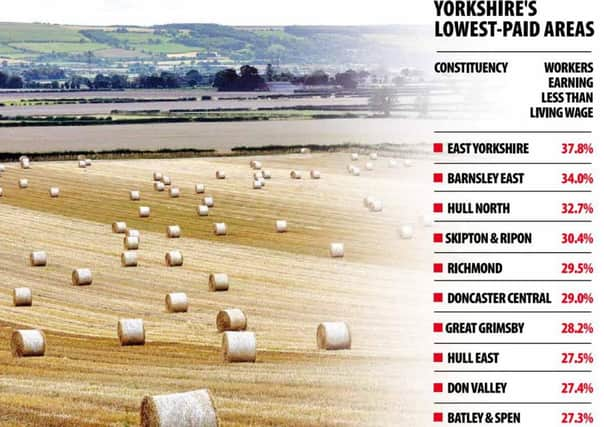Infographic: Yorkshire’s breadline beauty spots


But it’s fair to say that few people’s image of life on the breadline extends to the picture box villages of rural Yorkshire.
The reality, however, is that many such areas are dominated by minimum wage jobs and seasonal work which offer few opportunities for high-earners.
Advertisement
Hide AdAdvertisement
Hide AdIndeed, three of Yorkshire’s five lowest-paid areas are deeply rural.
“The recession has hit every part of the UK,” said Sir Greg Knight MP, whose East Yorkshire constituency has nearly 40 per cent of its workforce earning less than the £7.65 per hour living wage.
“I think there is sometimes a tendency by people living in cities to think that because of the great environment that people in rural areas live in, they don’t suffer the other problems as well - which of course they do.”
Sir Greg stressed, however, that in his East Yorkshire constituency - which covers Pocklington, Market Weighton, Driffield and Bridlington - the cost of living is generally much cheaper than in many other parts of the country.
Advertisement
Hide AdAdvertisement
Hide Ad“Although we have got a lot of people on low incomes, income figures alone can be misleading,” the Tory MP said.
“The quality of life and the cost of living also come into play – and the cost of living in East Yorkshire is certainly low. And that puts many people in a better overall position than someone on higher wages who lives in a city centre.”
The same cannot be said in parts of the Yorkshire Dales, however, where the stunning landscapes and remote locations mean both housing and fuel costs can be eye-wateringly high.
“Quite clearly it’s a huge issue for residents of Richmondshire, and particularly those who live in the national park,” said Coun John Blackie, the leader of Richmondshire District Council.
Advertisement
Hide AdAdvertisement
Hide Ad“The national park obviously attracts interest in its houses from beyond the area, so one of the reasons why we have such an acute affordable housing problem here is simply that local people can’t afford to purchase houses locally.”
Richmond has the fifth-highest proportion of low-paid workers of anywhere in Yorkshire.
Coun Blackie said there are nowhere near enough well-paid jobs available for local people to do - meaning the younger generation is often forced to move away.
“The skills base might be high, but the actual jobs that people can apply those skills to are very few and far between,” he said.
Advertisement
Hide AdAdvertisement
Hide Ad“Some years ago, when my eldest daughter came back from college, she wanted to stay in Hawes, and we looked for six months for a job within 20 miles that would take advantage of her degree. And in six months not one single job was advertised. So in the end she moved to Manchester.
“And so you have this phenomenon of under-employment – you have people here with a high level of skills, and all they can do is end up working in low-paid jobs.
“Those jobs are traditionally around tourism, which is very often part-time, or within agriculture, which is on the very edge of viability and doesn’t allow farmers to pay great wages.”
The issue extends far beyond rural areas, of course, with parts of Barnsley, Hull and Doncaster home to some of the largest proportions of low-paid workers in the region. Hull North’s Labour MP Diana Johnson pointed the finger of blame at the Coalition Government, which she said has targeted deprived areas with huge cuts to council budgets which are key to supporting those on the breadline.
Advertisement
Hide AdAdvertisement
Hide Ad“With Coalition cuts aimed most at the poorest people in the most disadvantaged areas, places like Hull have taken the heaviest hit,” she said.
“Along with the cost of living crisis and job losses, we’ve had more people under-employed and seeing their pay squeezed. Most of the surge in poverty has been seen by people in work, as we see from the profile of food bank users.
“It’s vital for places such as Hull North that not only do we have proper legal enforcement of the national minimum wage... but that we also have a careful roll-out of the living wage policy so that we can keep and create jobs, while steadily improving the spending power of those on low and average incomes.”
The Government insists it is already clamping down on employers who pay less than the minimum wage. Business Secretary Vince Cable yesterday ‘named and shamed’ five businesses around the country who had been caught under-paying their staff.
Advertisement
Hide AdAdvertisement
Hide AdBut the Liberal Democrat Cabinet Minister insists that actually forcing firms to pay the living wage would cost large numbers of jobs.
Sir Greg defended this approach, highlighting the Coalition’s repeated raising of the income tax threshold which has lifted take-home pay for 25 million workers.
“This present Government have taken a different approach, in that they want to see tax cuts in people’s pay,” the Tory MP said.
“But I am certainly a believer that we should have a safety net – and if a safety net is to mean anything, it’s no good having a safety net lying on the floor.
“It needs to be above the level at which you become critical. So this is something I believe ought to be kept under review.”